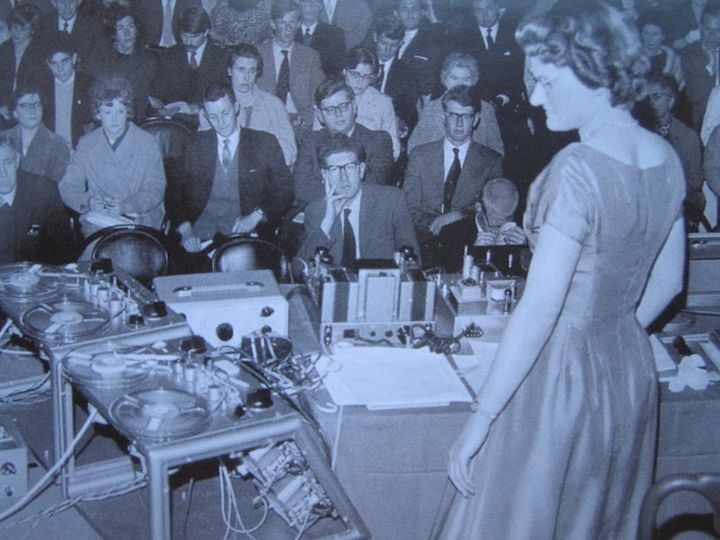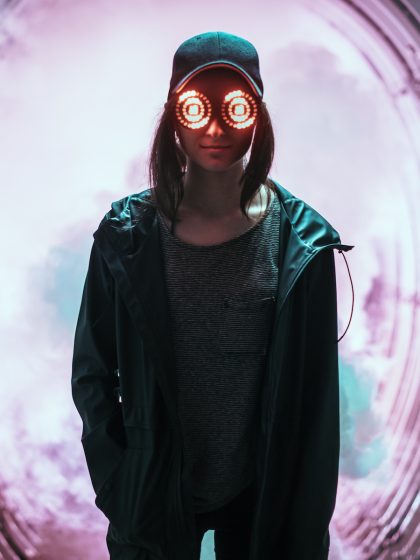Daphne Oram: Techno Originator
In honor of Women’s History Month, we are throwing some shine on the most influential female industry figures who helped pioneer electronic and dance culture.

Daphne Oram was the first female to do a lot of things. She was the first woman to build an electronic musical instrument. She was also the first woman to set up a personal electronic music studio (in an era when this was a very, very difficult proposition for a variety of reasons) and the first woman to direct an electronic music studio.
But she was also first—regardless of gender—in a lot of other stuff, too. She was one of the first British electronic music composers, period; an early proponent of musique concrète; and the creator of the eponymous Oramics technique (more on that in a minute). Some even call her the true originator of techno.
One of the earliest branches of the techno tree, Oram is responsible for helping push the medium into some truly alien places.
Born almost a hundred years ago, Oram passed in 2003, yet her work lives on through our endlessly electronic culture. On one hand, she looked plain and buttoned-up, “like Margaret Thatcher… with a cut-glass accent.” On the other, she’s one of the earliest branches of the techno tree and is responsible for helping push the medium into some truly alien places. Her work feels otherwordly and like something you might hear on an outsider NTS show in 2018. Her music wasn’t just early—it still feels fresh, contemplative, and full of undiscovered galaxies.
Recognized for her talent during World War II, Oram eschewed a spot in the prestigious Royal College to be an engineer at the BBC. There, with access to all sorts of gear, the young woman started chopping and splicing tape and manipulating it in myriad directions.
Over the next several decades, she’d develop new techniques and hardware. She made wildly experimental work, like Still Point, and developed her own pieces of gear to generate and manipulate synthesized sound: filters, oscillators, sine wave generators, all that jazz. This all culminated in Oramics (“the study of sound and its relationship to life,” as she described it) or “drawn sound,” in which machines drew on 35mm film, modulating the sound. Here’s what that actually looks like:
In 1958, Oram and a contemporary named Desmond Briscoe received money from the BBC to create what became the BBC Radiophonic Workshop. Oram managed the operation, which piped in electronic music to millions of British households, with music composed by the Workshop featured on various television shows, films, art exhibitions, commercials—basically any medium where sound could be a component.
Yet, Oram grew restless with the BBC’s slowness to foreground and prioritize the development of these nascent electronic sounds hitting the mainstream. So she left, merely a year after establishing the unit, in pursuit of more fulfilling pastures. These included all manner of writing, musical output, and even software development—itself a form of writing still.
Oram falls in with a larger wave of female visionaries like Delia Derbyshire, Pauline Oliveros, and Eliane Radigue from that mid-century period of consumer mobility and a technological explosion of ideas and machines. The Wire claims “post-war female composers [like Oram et al.] embraced the liberating technologies of analogue synthesis and computer composition as the means to bypass the male-dominated world of new music.”
And to an extent, they did, even if their influence is sometimes lost and relegated to more academic circles. But you don’t need to be an academic to appreciate Oram. Just listen.
Oram—and all the women in this wave of vast exploration and mechanical experimentation—deserve more books, documentaries, and overall re-evaluation. They’re more relevant now than ever. They tell us a lot about the last 100 years of music, but they also feel very of the moment and still, somehow, of the future.





